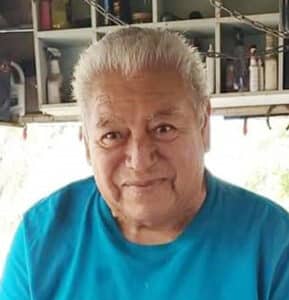Jessica Prieto’s father, Perfecto Salas, was her fifth family member to die of COVID-19, when he simply couldn’t fight it anymore, and succumbed to the disease at DHR Health in Edinburg just a couple of weeks ago, on Jan. 20.

“Both my father and my mother got the virus from my brother Joey, who died Dec. 29. My brother got the virus from the place where he got dialysis. He had underlying conditions, and the virus just wore him down. He was 48,” said Jessica, who bore close witness to both her brother and father.
“My mom was asymptomatic, but I think because she was always active, she wasn’t really affected. But my dad had been slowing down, and he just wasn’t strong enough to fight it,” she said.
The virus had affected the rest of the family — both physically and emotionally.
“We let our guard down, to be honest with you, when Joey died,” Jessica said. “We spent time with my parents trying to console them. Just trying to be there for them.”
Jessica, her husband and children contracted the virus, too.
“It really hit me hard, but I couldn’t go to the hospital,” Jessica said. “I had to take care of everybody.”
The virus killing Perfecto was a historical injustice. Since he was born on April 18, 1941, Perfecto fought the good fight, and survived at every turn.
When the city of McAllen pressured families that occupied lands where the future McAllen International Airport and the expressway would be built on the southern edges of today’s Bicentennial Blvd, the Salas family was forced to move. They did, just to the west of 23rd Street, sometime in the late 1950s or early 1960s. That’s how Jessica recalls her father telling the story.
“The Salas, along with the Herreras, the Rodriguez, the Sotelos and a couple of other families moved to a colonia they called La McAllen,” Jessica said. “In La McAllen, my dad built his house sometime in 1967. I know that because we have a picture of when Beulah hit, and my dad and the unfinished house were flooded.”
Perfecto was the third child of 12 that grew up as migrants working in Idaho, Wisconsin, Minnesota, the Texas Panhandle, Arizona, several farms across the Rio Grande Valley and other states.
“I’m sure I’m forgetting some states, but he used to tell us stories of how they worked as migrants,” Jessica said.
After his migrant days, Perfecto learned to work with glass and became a skilled glazier that Jessica describes as part artisan and part artist.
“He built so many beautiful things of glass in his house and for other people,” she said. “He was so good with his hands. His hands told so many stories — of hard work, of commitment, of so much.”
Aside from hard work, Perfecto was known to share a joke or two.
“And he was so funny. Oh my God, my dad’s laughter was contagious. He could make everybody laugh,” she said.
Jessica recalls her father telling his brother, “Chico, ojala que me muera yo primero porque no voy a poder cargar tu caja (Chico, I hope I die first, because I won’t be able to carry your coffin).”
“He was hilarious, and he was a hard worker, and he worked well into his 70s,” Jessica said. “He used to say, ‘ no puedes parar de trabajar porque los biles no paran ’” (you can’t stop working because the bills won’t stop coming).
Perfecto’s son, Luke Martinez-Salas, also bore close witness to his father.
“I got my work ethic from him,” Luke said. “We never stop.”
According to Luke, there was a time when Perfecto did stop. In an act of love, Luke says that his father resisted meeting Luke’s newborn son Ollie, who is now 7 months old.
“He was too afraid,” Luke said. “He kept saying, once it’s over, I’ll hold him.”
Regrettably, COVID took hold of Perfecto before he could meet and hold Ollie.
“I don’t know how to process this. It’s so much loss,” Jessica said.
Que en paz descanse Perfecto Salas. Rest in peace.
———
Francisco Guajardo, chief executive officer for the Museum of South Texas History at 200 N. Closner Blvd. in Edinburg, authored this story as part of an ongoing series entitled Bearing Witness. The museum’s effort aims to document some of the Rio Grande Valley lives lost to COVID-19. For more information about the museum, visit MOSTHistory.org.



